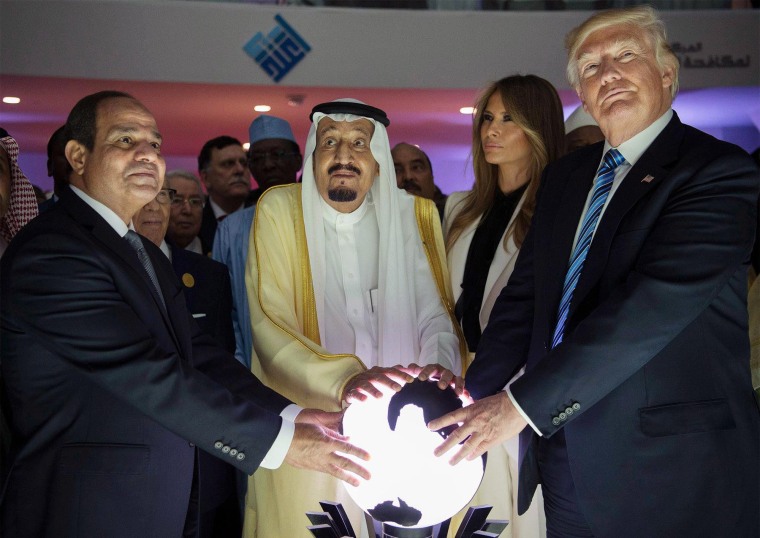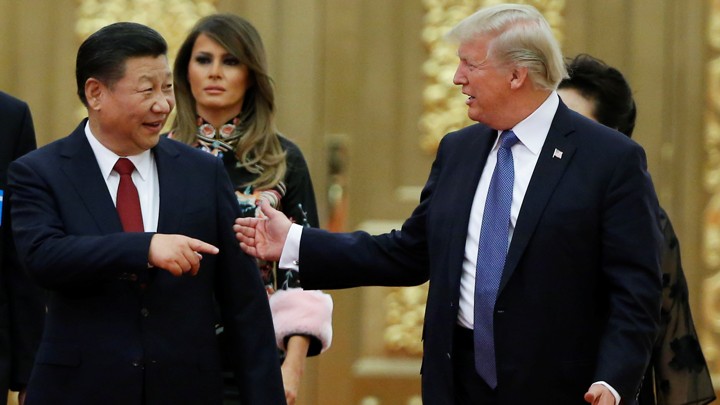Want to understand Trump’s foreign
policy? Just follow the money.
 In Donald Trump’s America, what
drives foreign policy decision-making in Washington isn’t interests and values
— it’s cash and ego. And other countries have noticed.
In Donald Trump’s America, what
drives foreign policy decision-making in Washington isn’t interests and values
— it’s cash and ego. And other countries have noticed.
Want the US to stop criticizing your
terrible human rights record? Dangle a possible trade deal.
Want the Trump administration to give you a pass on the gruesome assassination of a prominent critic of your brutal regime? A few billion dollars’ worth of US arms purchases should do the trick.
Need to get the American president on your side in a messy geopolitical fight? Buy some Boeing airplanes.
Want the Trump administration to give you a pass on the gruesome assassination of a prominent critic of your brutal regime? A few billion dollars’ worth of US arms purchases should do the trick.
Need to get the American president on your side in a messy geopolitical fight? Buy some Boeing airplanes.
Those aren’t just hypothetical
scenarios. They describe three very real foreign policy decisions the Trump
administration made in the past year.
From China to Saudi Arabia to Qatar,
Trump has either backed down or changed course on holding countries accountable
for human rights abuses and other bad behaviors solely because of the money
they spend — or say they’ll spend — in the United States.
In effect, Trump has put US foreign
policy up for sale. “Trump is quite easy to buy off for other countries,” Emma
Ashford, a US foreign policy expert at the Cato Institute, told me.
For some experts, Trump is a
visceral manifestation of an ugly truth of America’s conduct in the world.
“Trump’s actions take to new,
depressing heights what’s been true for a while: US foreign policy has become
unmoored from strategic vision and moral purpose alike,” Stephen Wertheim, a US
foreign policy historian at the Quincy Institute for Responsible Statecraft,
told me. “Trump’s shtick is that the world turns on base motives, and he’s
brought this ethos to foreign policy.”
But Trump is clearly the latest and
greatest practitioner of this longstanding practice.
Let’s start with China. Last month,
Chinese President Xi Jinping asked Trump to back off criticizing Beijing for
its crackdown on pro-democracy protests in Hong Kong, according to a
person familiar with the discussions. Trump accepted — because Xi made it a
condition to restart sputtering trade talks between their two countries.
The Financial Times, which first reported
that exchange on Wednesday, also noted that the Trump administration pressured
the outgoing US consul general to Hong Kong, Kurt Tong, not to mention China’s
policy toward the city in his farewell speech.
Xi continues to use the trade talks
as a lure to get what he wants from the American president. First, he asked
that the US stay quiet on China putting more than a million Uighur Muslims in reeducation
camps.
Second, he pushed for Trump to reverse the ban on US businesses working with Chinese telecommunications giants Huawei and ZTE — even though Trump’s own administration says doing that is a national security risk.
Second, he pushed for Trump to reverse the ban on US businesses working with Chinese telecommunications giants Huawei and ZTE — even though Trump’s own administration says doing that is a national security risk.
Asking Trump to tone it down on the
Hong Kong criticism is now the third time Xi has run the same play on Trump.
And each time, it seems, the president has fallen for it.
Saudi Arabia has gotten in on the
game too.
Last October, Saudi dissident and
Washington Post columnist Jamal Khashoggi was killed inside
Saudi Arabia’s consulate in Istanbul in an operation personally ordered by Crown Prince Mohammed bin Salman,
the kingdom’s de facto ruler.
After a week of calls from members
of Congress for Trump to punish Saudi Arabia, and the crown prince himself, for
the killing, Trump said he wouldn’t — because the country was spending a lot of
money in America.
“This took place in Turkey and to the
best of our knowledge, Khashoggi is not a United States citizen,” he told reporters in the Oval Office
on October 11, 2018. “I don’t like stopping massive amounts of money that’s
being poured into our country,” referring to his desire to sell $110 billion worth of weapons to
Saudi Arabia, adding that “it would not be acceptable to me.”
Trump on
possibility of punishing Saudi Arabia for apparently murdering a dissident
journalist: "I don't like stopping massive amounts of money that's being
poured into our country... they are spending $110b on military equipment and on
things that create jobs for this country."
It was perhaps one of Trump’s most
honest articulations about how he conducts foreign policy: He won’t call out a
country that infringes on human dignity as long as it’s willing to inject cash
into the American economy. And it’s especially fine if the affected people
aren’t US citizens. Trump, in this case, put a price tag on Khashoggi’s life.
The administration did sanction 17 Saudi officials in November,
and Trump has expressed his displeasure with the murder, but he refuses to
publicly blame the crown prince for his orchestration.
Trump’s fire sale of US foreign
policy continued this week during the White House visit of Qatari Emir Sheikh
Tamim bin Hamad Al Thani.
It was only two years ago that Trump called Qatar a “funder of terrorism at a very high level” and effectively supported a Saudi-led diplomatic blockade of the country.
It was only two years ago that Trump called Qatar a “funder of terrorism at a very high level” and effectively supported a Saudi-led diplomatic blockade of the country.
But in the Oval Office on Tuesday,
Trump continued his stunning reversal on the small
Gulf state, saying that he’s fine with Qatar now because it wants to spend
around $85 billion on US weapons, aircraft, and more.
“They’re investing very heavily in
our country. They’re creating a lot of jobs. They’re buying tremendous amounts
of military equipment, including planes,” Trump told reporters. “And they’re
buying commercial planes, as you know — very large numbers of commercial planes
from Boeing. And we very much appreciate it.”
This doesn’t keep happening by
accident — it’s a deliberate strategy by other countries to manipulate the
president. “A lot of foreign leaders are now relying either on flattery and
pomp to woo Trump, or they come to Washington with proof of ‘big deals’ that
will appeal to him in this way,” says Cato’s Ashford.
“It’s not so much that he’s a bad
negotiator, but that he’s negotiating for different things than most
presidents,” she continued. “He wants big wins that look good for him in the
media; a promise from another country to invest in US jobs does that, even if
it doesn’t solve any long-term problems, and even if the investment never
actually happens.”
Which means that the only thing
really anyone needs to do to understand US foreign policy these days isn’t to
read policy documents, listen to high-profile speeches, or have an innate understanding
of America’s history. No, one just has to follow the money.
